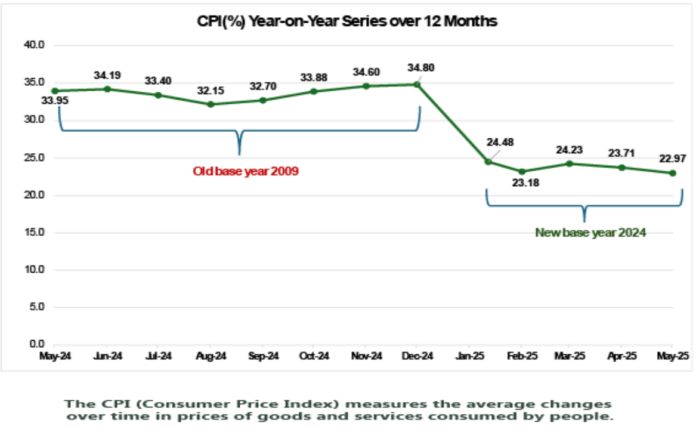Nigeria’s headline inflation rate declined to 22.97% in May 2025, marking a notable drop from 23.71% recorded in April, according to new figures released by the National Bureau of Statistics (NBS).
The moderation in inflation suggests a deceleration in the pace of price increases, although consumer prices remain elevated.
The Consumer Price Index (CPI) rose marginally to 121.35 in May, up by 1.83 points from April, reflecting a slower month-on-month growth of 1.53%—a 0.33 percentage point decrease from April’s 1.86%.
This indicates that while prices continued to rise, they did so at a more moderate rate than in the previous month.
On a year-on-year basis, the NBS said the headline inflation rate was 10.98 percentage points lower than the 33.95% recorded in May 2024, underscoring a significant slowdown in annual price increases.
Analysts attribute the improved figures to ongoing monetary tightening measures and improved food supply chain logistics.
According to the NBS report, the average inflation rate over the past 12 months, ending in May 2025, stood at 27.55%, a drop from 29.06% recorded in the corresponding period in 2024—reflecting a slight easing of long-term inflationary pressures.
In the urban areas, the price surge eased to 23.14% in May 2025, down from 36.34% in May 2024.
However, month-on-month urban price surge ticked up to 1.40%, higher than April’s 1.18%, hinting at a resurgence of short-term price pressures in city centres. The 12-month average urban inflation rate dropped to 29.30% from 31.07% in the previous year.
Conversely, rural soaring prices saw a more pronounced slowdown. The annual rural inflation rate fell to 22.70%, compared to 31.82% in May 2024. Month-on-month, rural inflation declined sharply to 1.83%, down from a steep 3.56% in April. The 12-month rural average stood at 25.56%, a fall from 27.27% the year prior.
While the figures show improvement, inflation remains a major concern for policymakers and households alike.
Economists warn that despite easing trends, persistent food inflation, energy prices, and foreign exchange volatility could challenge long-term stability.








